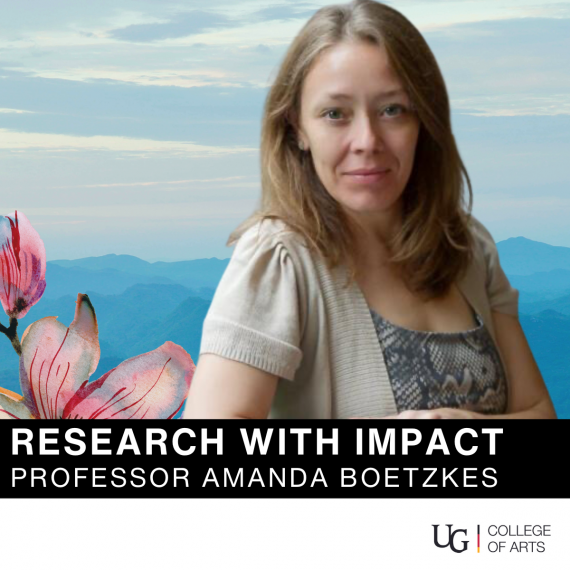Contemporary Art History and Theory Prof. Underscores the Importance of Collaboration in Addressing Environmental Issues

Dr. Amanda Boetzkes is a professor of Contemporary Art History and Theory within the School of Fine Art and Music (SOFAM) in the College of Arts at the University of Guelph. In addition to her roles as a researcher and educator, she serves as the Art History curriculum chair within SOFAM. Boetzkes has made significant contributions to art history literature through her publications including Plastic Capitalism: Contemporary Art and the Drive to Waste, The Ethics of Earth Art, and Ecologicity, Vision and the Planetarity of Art, while continuing to address pressing issues such as climate change. Boetzkes has also enriched arts literature through her contributions to journals such as South Atlantic Quarterly, After Image, Postmodern Culture, E-Flux, LA Furia Umana, and Stasis.
Boetzkes began her tenure as an art history professor on the aesthetics of garbage. Through this research she started a collaboration with the Rachel Carson Center for Environment and Society in Munich, Germany. Consequentially, she explained, her early research focused on social concerns and the aesthetics of many forms of environmental waste. Eight years ago, Boetzkes began to research the markers of climate change, in the Arctic, focusing on the complex effects it has on Inuit cultures, while also bringing that knowledge back to the community. A testament to her contributions to the Guelph community is her engagement in the project with the Guelph Institute for Environmental Research called Climate Stories, where researchers from various fields as well as the public share Micro-Climate stories, communicating issues of climate change and their relationships with the planet to enhance our understanding of the connections between humans and nature. According to the Micro-Climate Stories website, “Microclimate describes the climate of a very restricted area, particularly if that area possesses a climate that is different or unique in comparison to its surroundings. These can be subtle differences, but they can also be extreme.”
Boetzkes’ explained how her work examines the relationship between theories of consciousness, perception, and environmental change. She recalled a climate change workshop, At the Moraine, which she conducted in Greenland, describing it as one of the most inspiring experiences of her professional life. She reflected that the workshop was a collaborative effort involving artists, scientists, and climate change thinkers. Boetzkes invited a renowned Greenlandic artist, Jessie Kleemann, to perform at the workshop and innovatively arranged for the entire group to be taken to the top of the Greenland ice sheet for the performance. Boetzkes remarked that the event was a resounding success, with the video of the performance subsequently being displayed in many places, including the United Nations' climate change conference COP28, held last year in Dubai. She emphasized how projects like these not only inform her course curriculum but also shape her teaching style and worldview. By engaging in these global endeavors, Boetzkes finds herself better aligned with fellow researchers, facilitating collaborative solutions to complex environmental problems.
When describing her research approach as an art historian, Boetzkes explained that her method involves consulting with peers in the field and allowing that process of consultation to influence one's own imagination. To emphasize this perspective, she commented, "I bring those perspectives, but then I also write differently because of that attunement." This approach differs significantly from the traditional method of visually analyzing a piece of art for its meaning, Boetzkes explained. She believes that this collaborative research process brings about a transformative shift in both the researcher's perspective and their work.
Drawing on her extensive background and research in art history, Boetzkes offered invaluable advice to those newly embarking on their own research journeys. She emphasized the importance of prioritizing passion for the subject over financial motivations when choosing a career path. Underscoring the significance of exhaustively delving into one’s field of research, she added, “You [have to be] prepared to nourish yourself on that knowledge that you are deepening. [Don’t] be afraid to go deep because that will sustain you.”